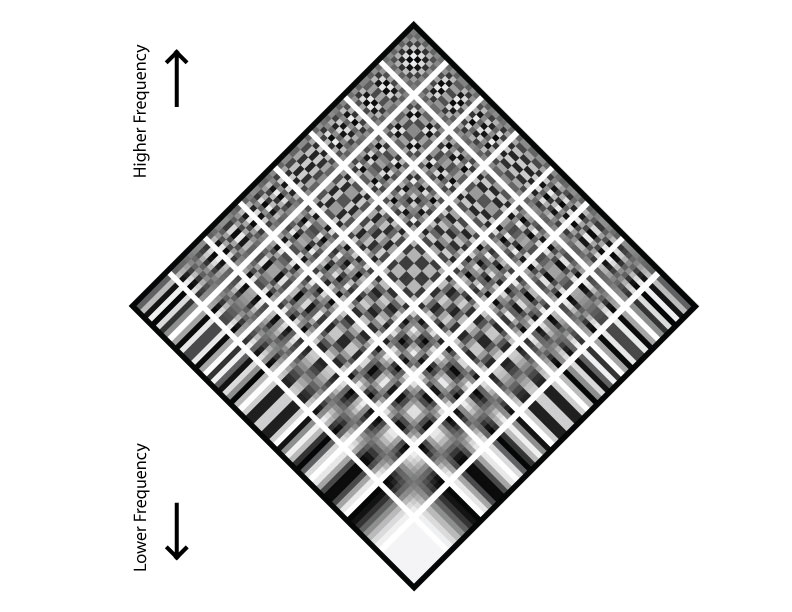I recently co-authored an article with Jason LaRiviere titled "Compression in Philosophy," published in a special issue of the journal boundary 2 devoted to the work of Bernard Stiegler. (Email me if you can't access the article due to paywall.) The piece ends with the following "Lossy Manifesto."
By way of conclusion let us return to Sterne and the debates surrounding compressive media. Such debates usually entail a number of claims: (1) media abstract, reduce, and encode a complex and heterogenous world, and (2) once encoded, media files may be compressed and expanded using lossless algorithms that preserve the integrity of data, or alternately (3) media files may be compressed using lossy algorithms that necessarily delete data. Given the above discussion we are in a better position to amplify and evaluate these various positions.
Regarding the first point, we conclude that encoding is synonymous with the above labeled abstract compression. Encoding is thus synonymous with the metaphysical tradition itself, in which existence appears as a specific encoding of matter. The abstractions of this life (language, mind, technology, and so on) are thus a kind of encoding of the fundamental substrate of nature, whether it be Deleuze's plane of immanence, Plato's essential forms, or Aristotle's substance. The abstractions of this life are thus also instances of data loss, given that any particular formation will exclude or delete the multiplicity of alternate virtualities that lie within the fundamental substrate of nature. The actually existing transcendentals “forget the details” of the absolute by remaining invariant and consistent across time and space. In this way all media and indeed all philosophy are digital in that they encode nature via processes of distinction and data loss.

Once encoded, the world may be compressed still further via lossless or lossy algorithms. Yet given that no data is actually deleted during lossless compression, lossless compression--touted most visibly in aesthetic concepts like fidelity--is essentially a misnomer, and in fact not a mode of compression at all. Rather, lossless compression is merely a synonym for technical transcoding. Lossless compression simply converts one mode of philosophical encoding into another mode and back again. Lossless compression is the "normal science" of the world, and thus acts to repeat and propagate formations of self-similarity. In this sense lossless compression entails a certain amount of philosophical cynicism, in that it assumes nothing will ever alter the basic encoding of the world, even as the surface effects of encoded objects shift from one shape to another.
In sum the tradition of abstract compression in media and philosophy relies on a basic two part mechanic: first encode nature via data loss, then transcode nature via lossless compression. Given this mechanic, compensatory strategies often appear under the guise of decompression: Marx's demystification of the “compressed” commodity, Deleuze and Guattari's liberation of the repressed desiring machines, or any number of other strategies. Indeed in the latter twentieth century expression emerged as a key virtue of the good life. Contra representation, expression allows subjects to realize themselves without the fetters of repression and without recourse to any kind of metaphysical essence. As actualization or territorialization, expression toggles between a normatively good compensatory alternative to metaphysical compression, and a normatively bad--albeit often necessary--deletion of the alternate potentialities of the virtual. In fact much of the most interesting work being done in theory today hinges precisely on “the reality of abstraction” as the Marxists put it, or “the actuality of the virtual” as the Deleuzians put it.
Yet, as we have hoped to show here, both of these alternatives rely on a specific concept of compression, the tradition of abstract compression. Our proposal is that an alternate approach to compression also exists. This alternate approach is rooted in lossy rather than lossless compression. In contrast to its lossless cousin, lossy compression moves in the direction of a generic or prophylactic ontology. Lossy compression has an unusual relationship to philosophy and theories of mediation: it extends the logic of philosophy and media (data loss), but deploys itself against the spirit of philosophy and media (expression, distinction, representation).
Lossy compression thus is imperative today for theories of media and mediation, because lossy compression is the best way to upcast toward the generic. Lossy compression accomplishes this via an impoverishment or impotentialization of existence. (Recall how philosophical metaphysics claims something quite different, that existence is a reduction from essence.) For these reasons we ally ourselves with an alternate tradition in which the world tends toward its own encryption, in which being shrinks rather than emerges, in which data tends to vanish and disappear rather than find its most visible expression. Compression is on the side of cryptography. And in order to survive this life we need a kind of theoretical project that is more and more cryptographic with each passing day.
Compression is not some mere epiphenomenon that must be reduced or avoided. Compression is not merely the unwelcome identity of philosophy. Rather we contend that the best response to philosophy is to compress it further. We need more compression in philosophy, not less. And through the compression of philosophy--the deletion of data via processes of immanence, opacity, obfuscation, and encryption--will arrive the new techniques of the generic.